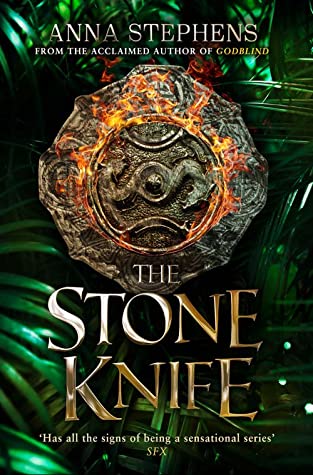I’ve heard so many great things about the Godblind trilogy over the years, but for some reason I’m only now picking up Anna Stephens’ work. Thankfully, I didn’t wait to dive into this new and incredible series.
The first thing you’ll notice when you pick up The Stone Knife is the learning curve. Epic fantasy fans are used to multiple POV characters and fictional settings, but this book does away with the medieval European trappings entirely. The world draws heavily from Central America and has recognizably Mayan inspirations woven throughout. There’s also something like seven POVs that are all introduced quickly, making it a while before you get to experience the same character twice.
And trust me, you’ll want to spend time with these characters. There’s a deaf warrior! Two of the main male characters are happily married to each other! And one of the leaders of the oppressive empire is also a mother who cares deeply about her son!
With a series name like The Songs of the Drowned, it’s no surprise that music features heavily in the story. The musical magic is not quite a “hard” magic system, but you can more or less figure out the handful of rules that exist. Not that you’ll be spending too much time thinking about logistics when the imperialistic empire and singing reptilian river monsters are so freaking chilling to read about.
If the Drowned start to sing? Get ready to offer yourself to them willingly with a smile on your face. And if you hear the empire’s song? Good luck having your thoughts slowly twisted into obedience.
I particularly appreciated the empire’s leader, known as the Singer, being simultaneously a ceremonial figurehead and ridiculously overpowered. It’s a delicate line to walk and Stephens pulled it off with panache. However, the Singer’s occasional interludes between chapters regularly put the brakes on a story that otherwise never let up in the pacing.
I also always enjoy seeing multiple sides to a conflict, especially when there are opposing characters even within each faction. There’s always just a little room for empathy toward the evilest characters and a bit to hate about the “good” ones. This complex approach to morality is one of my favorite aspects of grimdark, though I hesitate to label The Stone Knife as such. It’s not as bleak as what I’d expect from that subgenre, though there are certainly a few scenes of horrific violence (seriously, major content warning for violence). Even so, those moments never felt gratuitous, always serving the story and furthering the major themes.
While I wouldn’t call this story bleak, I found myself regularly distrusting moments of happiness. Part of me was always waiting for the other shoe to drop, and I was frequently proven right. Though on the other hand, some of the character deaths could have been even more brutal if more time had been spent getting readers emotionally invested first. But maybe I’m just a masochist.
Minor nitpicks aside, I really adored The Stone Knife, and can’t wait to see where the sequel goes from here. I’ve obviously been missing out on Stephen’s incredible writing. Don’t make the same mistake!

